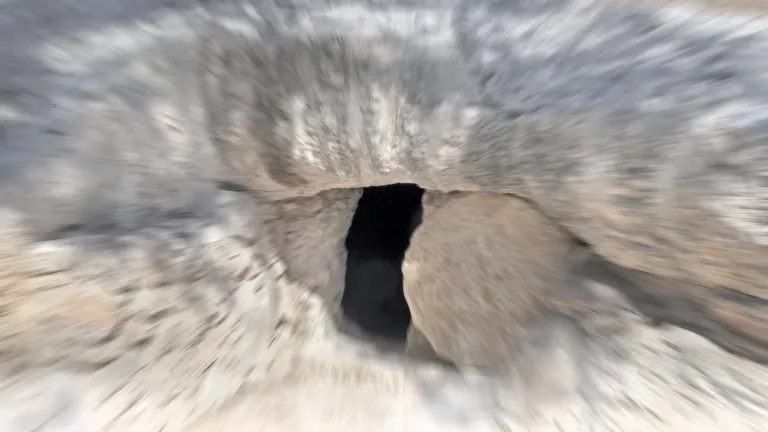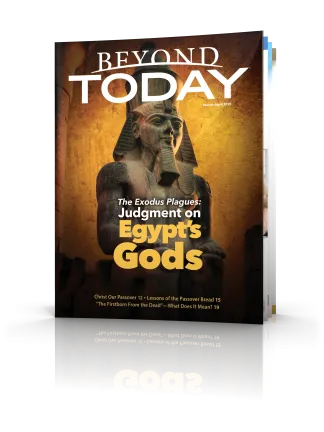“The Firstborn From the Dead”: What Does It Mean?

The apostle Paul referred to Jesus Christ as “the firstborn from the dead.” If He is “first,” what does that mean? The obvious answer is that others will follow. You need to understand what the Bible says about this crucial subject!
God is creating a divine, spirit family—and you can be in it! The moment Jesus Christ walked out of the tomb, a momentous opportunity began for you and me. With His resurrection and ascension to the very throne of God, Jesus was the first of many who would become spirit beings dwelling in the presence of God.
The God family, from the beginning, comprised two divine Beings—God and the Word (John 1:1-2). The Word became flesh some 2,000 years ago as the Son of God, Jesus Christ (verse 14). After Jesus’ human life and death, He was resurrected to divine spirit existence as “the firstborn from the dead” and “firstborn among many brethren” (Colossians 1:18; Romans 8:29, emphasis added throughout).
Who are the “many brethren”? It’s all God’s faithful people, those who will join Jesus Christ as His brothers and sisters as part of that divine family of God when they are resurrected to immortal spirit life. And so, this physical life is not all there is. But, please note, we are not talking about going to live in heaven when we die—as you will see!
Let’s explore this more as we see what Scripture has to say on this important topic.
The offspring of God, in His image
Jesus was spiritually born in the resurrection as the first of many brethren or children to follow later. As pointed out in Acts 17:28-29, we are God’s offspring: “‘For we are also His offspring.’ Therefore, since we are the offspring of God, we ought not to think that the Divine Nature is like gold or silver or stone, something shaped by art and man’s devising.”
The Greek word for offspring here, genos, means “kindred,” “race, “kind,” “stock” or “family.” We are of God’s family type.
In the ancient Hebrew, Psalm 82 sheds more light on this fact. In Psalm 82:6, God refers to human beings as “gods,” this being equated here with “children of the Most High.” That makes perfect sense. When any entity bears offspring, its offspring are the same kind of entity. The offspring of human beings are human beings. The offspring of God are “gods,” as Jesus confirmed in quoting this passage in John 10:34-36.
Of course, when human beings are referred to as gods in Psalm 82, they are still declared imperfect and subject to corruption and death. So they are of the divine family in only a restricted sense to begin with.
One aspect of this is that man has been created in God’s image and likeness on a physical, mortal level with limited dominion, resembling God but without His divine character and glory—yet. So, the other aspect of this is that man has the ultimate potential of becoming the same kind of beings God the Father and Jesus Christ now are. Jesus was “the firstborn among many brethren”—obviously meaning that others will follow.
As noted earlier, the apostle Paul explained that Jesus conquered death and is “the firstborn from the dead” (Colossians 1:18). In other words, Christ paved the way into the Kingdom of God, so that those who are truly devoted to Him can have assurance and expectation of the resurrection. “This hope we have as an anchor of the soul, both sure and steadfast, and which enters the presence behind the veil, where the forerunner has entered for us, even Jesus” (Hebrews 6:19-20).
Jesus overcame death and is the forerunner, the first to be resurrected from the dead, making eternal life possible for many others to follow. As we noted earlier in Romans 8:29, He was “the firstborn among many brethren.”
So what does that tell you and me? The Bible leaves no doubt —there will be others to follow in time. As Paul tells us, “For if we have been united together in the likeness of His death, certainly we also shall be in the likeness of His resurrection” (Romans 6:5).
The Bible is speaking here of a resurrection to permanent, everlasting life as a spirit being—not simply a temporary restoration to life in a physical body. And again, as we will see, this is not talking about going to live in heaven when we die.
The resurrection of the firstfruits
In several places in the Bible we see that individuals (such as Lazarus) were restored to physical life prior to the resurrection of Jesus. But they all died again.
Paul makes an important distinction between those who lived, died, were resurrected and then died again and the future resurrection of God’s firstfruits: “For our citizenship is in heaven, from which we also eagerly wait for the Savior, the Lord Jesus Christ, who will transform our lowly [physical, material] body that it may be conformed to His glorious body” (Philippians 3:20-21; compare 2 Corinthians 5:1-5).
Paul is talking about a future, glorious, spirit existence. And notice here that Jesus Christ will come from heaven to “transform our lowly body that it may be conformed to His glorious body.” An entire chapter of the Bible, 1 Corinthians 15, discusses this resurrection. It begins by affirming Jesus’ own restoration to life, followed by a description of the similar restoration to life of His disciples and true followers of this age—God’s firstfruits (see James 1:18). Jesus Himself is the first and foremost of the firstfruits (compare 1 Corinthians 15:20-23).
Paul describes the nature of this resurrection of the firstfruits: “It is sown a natural [physical] body, it is raised a spiritual body . . . ‘The first man Adam became a living being.’ The last Adam [Jesus Christ] became a life-giving spirit . . . And as we have borne the image of the man of dust [Adam], we shall also bear the image of the heavenly Man [Christ]. Now this I say, brethren, that flesh and blood cannot inherit the kingdom of God” (1 Corinthians 15:44, 1 Corinthians 15:49-50). Thus we will have bodies composed of spirit, as Jesus does.
We also see here that even true Christians cannot enter the Kingdom until the return of Jesus Christ to the earth (pictured in God’s plan by the Feast of Trumpets, one of His annual Holy Days observed in September or October). On the fulfillment of this day, when the last trumpet sounds, the dead in Christ will be resurrected, and God will complete the harvest of His firstfruits.
Notice 1 Corinthians 15:51-52: “Behold, I tell you a mystery: We shall not all sleep, but we shall all be changed—in a moment, in the twinkling of an eye, at the last trumpet. For the trumpet will sound, and the dead will be raised incorruptible, and we shall be changed” (see also 1 Thessalonians 4:16). At that epochal time, Christ’s disciples and true followers will experience what the Bible calls the “better resurrection” (Hebrews 11:35).
In Colossians 1:15 the Greek word prototokos, translated “firstborn,” is a title based on birth order. The Greek-English Lexicon of the New Testament and Other Early Christian Literature explains that it speaks “of Christ, as the firstborn of a new humanity which is to be glorified, as its exalted Lord is glorified.”
This further explains the meaning of firstborn in the context of Colossians 1:18, where Christ is described as “the firstborn from the dead, that in all things He may have preeminence.” He is firstborn from the dead, the first to arise in a spiritual resurrection.
Those who are called into God’s Church in this age before Christ’s return, the firstfruits, are also called the “church of the firstborn” (Hebrews 12:23). As Jesus is the first of the firstfruits of salvation, so He is also the first of the firstborn. And all these together precede others to follow later. Thus, others will be born into God’s spiritual family in the ages yet to come, when salvation is at last offered to the world at large.
Will you go to live in heaven when you die?
Most people assume we will go to live in heaven when we die, but that isn’t what is taught in Scripture. To the contrary, we are told, “No one has ascended to heaven but He who came down from heaven, that is, the Son of Man who is in heaven” (John 3:13). The apostle John wrote these words near the end of the first century, long after most or all of the other apostles—not to mention the great heroes of faith of the Old Testament period—had died. He knew that only Jesus Christ had been resurrected and gone to heaven. No one else had in all of human history!
To clarify this, we are reminded in the book of Acts, in the apostle Peter’s inspired message on the Feast of Pentecost when the Church was founded: “The patriarch David . . . is both dead and buried, and his tomb is with us to this day . . . For David did not ascend into the heavens” (Acts 2:29, Acts 2:34). This tells us that even a man “after [God’s] own heart” (Acts 13:22) still rests in the grave, awaiting the resurrection at Jesus’ return. No one, other than Jesus Christ, has ascended to heaven or been resurrected to immortal, spirit life.
So when Jesus does eventually return to earth as King of Kings and Lord of Lords, will He gather the saints, His followers from this age, and take them to live in heaven? The surprising answer from the Bible is no. He will have the saints rule with Him on earth for at least the first 1,000 years—not in heaven!
In the very last chapter of the Bible, Jesus directly says of His return to set up His Father’s Kingdom, “And behold, I am coming quickly, and My reward is with Me, to give to every one according to his work” (Revelation 22:12).
Our reward is being brought with Jesus when He returns to the earth. Jesus’ throne will be here on earth, and the saints will serve with Him here—not in heaven.
To further prove that we will not be living in heaven, Revelation 5:10 directly states that the resurrected saints “shall reign on the earth” with Christ. Revelation 20:6 adds: “Blessed and holy is he who has part in the first resurrection. Over such the second death has no power, but they shall be priests of God and of Christ, and shall reign with Him a thousand years.” Jesus will reign on the earth (Revelation 11:15; Daniel 7:14, Daniel 7:27)—and that is where the resurrected saints will reign with Him!
Yes, the resurrected saints will then serve Christ for 1,000 years, reigning on the earth as immortal spirit beings over whom death no longer has any power. This is the amazing future in store for the saints of God!
No big secret!
One major religious falsehood embraced by millions of Christians today is the theory of the “secret rapture” to supposedly precede the time of tribulation before Christ’s return. The truth is that the resurrection of the saints will occur when Christ returns in power and glory, which will be visible to all of humanity. It will not be done in secret.
When Jesus returns at the sound of the seventh trumpet, “all the tribes of the earth will mourn, and they will see the Son of Man coming on the clouds of heaven with power and great glory. And He will send His angels with a great sound of a trumpet, and they will gather together His elect from the four winds . . .” (Matthew 24:30-31).
Everyone—all tribes, peoples and nations—will see Jesus return! And the saints, the elect, will be resurrected and gathered at the very same time as Jesus’ return. It will not be done in secret. The popular “rapture” theory is a complete falsehood, based on misunderstanding many biblical verses about the resurrection.
God’s great purpose for you
This is God’s purpose for man—to give us eternal life in His family through the resurrection, to be His divine offspring, His sons and daughters. This is why Paul described Jesus as “the firstborn among many brethren.”
If God is calling you at this time, how can you ensure you are counted among Christ’s brethren who will inherit eternal life in God’s Kingdom? We read of an amazing prophetic scenario in the book of Revelation that outlines who will be counted among these saints, those who will receive that reward and resurrection upon Jesus’ return: “And the dragon [Satan the devil] went to make war with . . . [those] who keep the commandments of God and have the testimony of Jesus Christ” (Revelation 12:17). And two chapters later the saints of God are described as “those who keep the commandments of God and the faith of Jesus” (Revelation 14:12).
Notice these descriptions of God’s faithful servants: They keep the commandments of God and are filled with the faith of Jesus through the power of the Holy Spirit, which is given to those who “obey Him” (Acts 5:32). You see, it’s more than just accepting Jesus as your Savior. You then have to do something in how you live your life. You have to keep God’s commandments and have the testimony of Jesus Christ. It takes work and effort!
Prepare now
We can thank God that there is a resurrection when truly faithful Christians will be caught up into the air at the glorious second coming of our Lord and Savior Jesus Christ.
This is the great hope for all who trust in God and believe in Him and His purpose for their lives. There is no time to waste in developing your relationship with God the Father and His Son.
The time is now. Start today by approaching God in prayer and asking for His help in submitting to His will in your life. Stay close to God the Father and Jesus Christ and leave the fear of the future behind. Trust in the hope of the resurrection, assured of Jesus being “the firstborn from the dead” and the “firstborn among many brethren”!




![The awesome result of our Creator's activities on this earth lies "in bringing many sons [and daughters] to glory". gravestones](/sites/default/files/public/styles/fp_widescreen_768x432/public/image/article/the-resurrection-of-the-dead-what-does-the-bible-really-teach_1.jpg.webp?h=9d96f97f&itok=YgcCIU9U)

